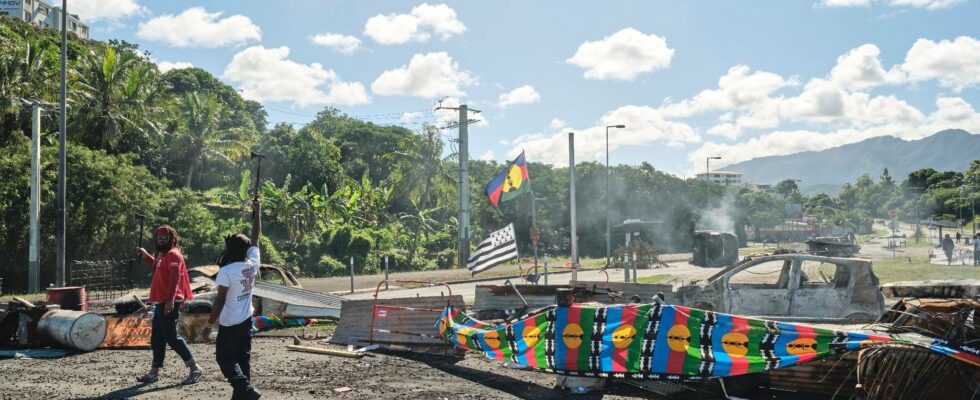The night from Sunday to Monday in Nouméa and its surrounding area was relatively calm, even if traces of clashes were visible in the Vallée-du-Tir district, an independentist stronghold. Elsewhere, many dams have been cleared, others are still in place but deserted.
The road leading to Nouméa international airport, very degraded in places, remains littered with vehicle wrecks. As a result, the airport will remain closed to commercial flights until at least June 2. This will bring the closure of the airport, decided the day after the riots, to almost three weeks.
Information to remember
⇒ The state of emergency in New Caledonia will be lifted on Tuesday morning
⇒ Macron ready for referendum on contested reform
⇒ Seven additional mobile force units sent
State of emergency in New Caledonia soon lifted
The state of emergency in New Caledonia will be lifted this Monday at 8 p.m. (Paris time), i.e. 6 p.m. GMT, Tuesday at 5 a.m. in Nouméa, the French presidency announced on Sunday. The lifting of these exceptional measures must “allow meetings of the different components of the Kanak and Socialist National Liberation Front (FLNKS) (Editor’s note: the main independence component) and travel to the roadblocks of elected officials or officials able to call upon their lifting,” explained the same source in a press release. Despite still high tensions, “the President has decided for the moment not to renew the state of emergency. It will not be extended” beyond its legal deadline of 12 days, underlined the Elysée in the press release sent during the night from Sunday to Monday.
The state of emergency was established on May 15 (Paris time, May 16 in Nouméa), after violence which has left seven dead to date and the detonator of which was the adoption in Paris of a reform providing the unfreezing of the local electoral body, that is to say its expansion to people established for at least 10 years. Supporters of independence believe that this thaw risks “minorizing” the indigenous Kanak people even more.
The executive hopes that this loosening of restrictions will allow a re-establishment of dialogue on the numerous roadblocks still in place, targeting in particular the independence collective CCAT (Cellule for Coordination of Field Actions) which is at the forefront of the protest. The FLNKS for its part on Saturday renewed “its call for calm” and asked to “loosen the grip on the main traffic routes”.
Macron ready for referendum on contested reform
“I can go to the referendum at any time” on the electoral reform already adopted by the Senate then the Assembly, argues the head of state in an interview at the Parisian. Emmanuel Macron recalls, however, that his initial desire is for New Caledonian elected officials to agree on “a global agreement which would enrich the text already voted by Parliament”.
The possibility of organizing a national referendum on the unfreezing of the electorate in New Caledonia comes from a simple “reading of the Constitution” and is “not an intention”, assured Sunday Emmanuel Macron on the sidelines of a visit of state in Germany. “I just recalled what the Constitution was,” said the head of state during a press conference alongside German President Franz-Walter Steinmeier. Because “once a constitutional reform is voted on in the same terms by both chambers”, namely the Senate and the Assembly, “at that moment the president has the choice to submit it to Congress”, it is that is to say to the deputies and senators gathered at Versailles, or “at the referendum”. “It is a reading of the Constitution, not the expression of an intention,” insisted Emmanuel Macron.
This idea of a national referendum did not convince Philippe Gomès, one of the leaders of the moderate loyalists, who sees it as “dangerous nonsense”. “So in 2024, we would ask the French people to decide the question of the Caledonian electorate outside of any local consensus,” said the leader of the non-independence party Calédonie Ensemble in a press release.
Seven additional mobile force units sent
At the same time, the Elysée announced in a press release sent this night the dispatch “in the coming hours” of “seven additional mobile force units, or 480 mobile gendarmes”. In total, some 3,500 security forces will be deployed on the archipelago.
“Three days after his return from New Caledonia, the President of the Republic congratulates the internal security forces engaged there. He wishes to reiterate his support for the victims of the violence and the families of the deceased, in particular the two gendarmes killed in the exercise of their functions”, indicates the press release from the Elysée.
